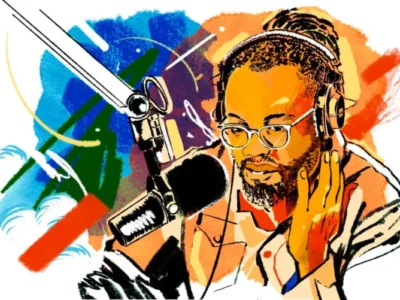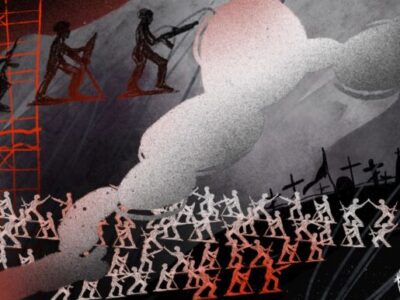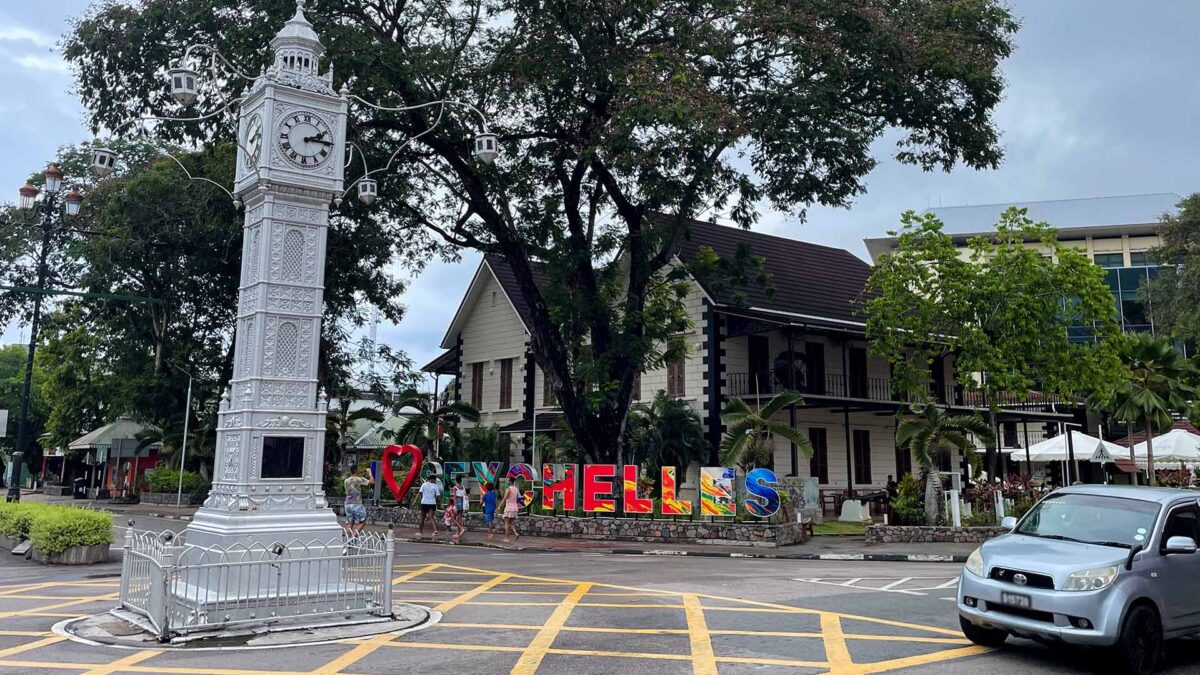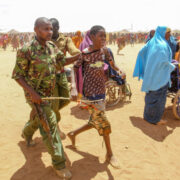
2024 was dubbed the year of the “podcast election” — so powerful was the format in helping candidates in the US reach new audiences and get out the vote.
But it was also labeled a “hold on to your hat” type of year, a period in which shows were cut, budgets slashed, and even top talents had to deal with the fallout of losing their backers.
Amid the paradoxical highs and lows, it was also a year of innovations in many places. More podcast creators are experimenting with video, and the expansion of AI has led to time-saving innovations in creating transcripts and translation, making it easier than ever for creators to bridge language gaps and spread their story.
At the 2024 Podcast Show in London, Anne Dargusch, from TransPerfect, a global translation agency, said: “The trend has been content from the US and the West going out to the world. We are seeing a huge flip. What’s happening is people are looking to bring content from other places to English users.”
It’s now possible for a host who records in English to be translated into Spanish or German, and sound both like themselves and like they have an authentic accent. Producers can play with timbre and tonality to get to a recording that sounds like a native speaker’s level of fluency, panellists at the show said.
“It’s removing the barriers” to reach across borders, said Stefano Fallaha from Podeo, the Arab world’s largest podcast platform. While podcasting is still “in its advent” in that region, he said, many people in the field see opportunities to reach new audiences by translating podcasts into some of the 20 different Arabic dialects.
It will be fascinating to see which investigative podcasts travel to become global hits in 2025.
As for this list, featuring 11 investigative podcasts from around the world, those that broadcast in languages other than English are specified. Ten of the titles are from 2024 — one is from December 2023.
In terms of topics, there is an archival feel to many of the podcasts chosen by our team this year — from diving into land rights for former slaves after the US Civil War, to investigating a massacre that occurred in Iraq 20 years ago, to a another podcast investigating a lesser known angle of the slavery tragedy: the Swiss investors and traders who got rich from the process.
Also on our list are podcasts investigating a spy drama in Germany, a deep dive into the background of a controversial Central American president promising to be the “world’s coolest dictator,” and an exploration of the controversial — and murky — sphere of gender testing in elite sports.
One of the podcasts on our list is by investigative reporter Connie Walker, whose award-winning series was subsequently dropped by Spotify. For many, that move was another sign of how hard times have become for journalists in the medium. But as Walker herself told the Columbia Journalism Review, the changes that have been happening in the last few years also offer the industry a time for reflection.
“As an Indigenous woman, after 20 years in this industry, I feel so incredibly grateful and lucky that I have been able to get to do this work over the last few years and be supported. Because for a long time, that wasn’t the case,” Walker said. “And now I’m in a position where I’m like, OK, I want to keep going. How are we going to make that happen? That’s a huge question in journalism now that we should all be talking about. What is the path forward?”
In the Dark — The New Yorker
In 2005, 24 people, including women and children, were slain by US Marines in the Iraqi town of Haditha. The marines claimed they were counterattacking hostile forces that day, although investigations later found all of the dead were civilians with no ties to the insurgency. Many of the victims were from the same families – the youngest was a child of three. While four marines were charged with murder, the cases were later dropped, and despite a war crimes investigation by the US military, no one was ever punished for the killings.
After four years of investigative reporting — and after suing the US government for documents connected to the Haditha incident — Madeleine Baran and The New Yorker uncovered photos and thousands of documents related to the massacre. They interviewed survivors in Iraq and traveled across the US to speak to members of the military in order to reconstruct what happened, as well as to examine the failure of the official US investigation.
Finally, thanks to multiple FOIA responses, the team built what they call the biggest known database of possible war crimes committed by US soldiers in Afghanistan and Iraq since 9/11, giving access to anyone who wants to investigate similar incidents.
This podcast will leave a lasting impression — and is notable for the way it explores the failures of the US justice system while unveiling atrocities and capturing a heartbreaking human experience. — Nikolia Apostolou, Resource Center Director
Bukele: Señor de los Sueños / Bukele the Man from Los Sueños — Radio Ambulante, Central
Language: Spanish
When the current president of El Salvador, Nayib Bukele, was elected in 2019, he was seen by many as a “cool, millennial president” — the youngest in Latin America. His promise to shake things up in traditional politics, along with his charm, made him a very popular leader. But he has turned the country into an authoritarian experiment: he now dubs himself “the world’s coolest dictator,” and ran for reelection in 2024 despite the country’s constitutional ban on running for a second term. Now, he has control over all three branches of the government and is ruling under a state of emergency that he declared himself.
This six-episode podcast series is filled with first-hand accounts, expert interviews, archival footage, and on-the-ground reporting, all based on hundreds of hours of research. Reporters chart his rise to power from the very beginning — speaking to a former teacher of his and a school friend. Journalists from around the world will find it particularly useful, as it dives deep into the complexities of Bukele’s presidency and its implications for democracy and human rights. Reporters will also gain insight into the power dynamics at play, which can inform their own reporting on similar global issues. — Andrea Arzaba, Spanish Editor
Tested — CBC and NPR
This six-part series, a passion project from US journalist Rose Eveleth (who spent most of her life savings to report it), delves into the murky world of gender testing in world-class sports. Launched in the weeks leading up to the 2024 Paris Olympics — where controversy and gender claims against an Algerian boxer took center stage — the podcast offered much-needed nuance, scientific understanding, and actual reporting to a conversation dominated online by stereotypes and speculation. The series starts by going deep into the history of women in sports — and the routinely paternalistic and prejudicial way that female athletes have been treated, which included, for a short time, both mandatory genital checks and the Kafkaesque requirement to carry a “certificate of femininity.”
Bringing the story into the modern era, “Tested” centers on the struggles of the promising Namibian sprinter Christine Mboma, who is forced to navigate a world of ever-changing rules about how international athletics organizations define female athletes. Mboma, a woman born with a Differences of Sex Development (DSD) condition that can produce higher levels of testosterone among other physical traits, is joined by a number of other women athletes featured in the series, most of them from Africa. The series examines how policies aimed at protecting competition and gender fairness force some women into an almost impossibly unfair personal choice: chemically alter who they are to keep competing or stay true to their natural selves and give up on their life-long dreams. — Reed Richardson, Managing Editor
40 Acres and a Lie — Reveal from Center for Investigative Reporting, Center for Public Integrity, Mother Jones
The title of this three-part podcast refers to a US government program — colloquially known as “40 acres and a mule” — that gave formerly enslaved people land after the US Civil War, only for it to be taken back 18 months later after President Lincoln was assassinated and his sympathetic-to-the-Confederacy successor, Andrew Johnson, stripped them of the land.
Reporters on the team spent two-and-a-half years building the story, unearthing thousands of records once buried in the National Archives — such as land titles for 1,250 formerly enslaved Black Americans who had earned land as reparations and later lost it. Of particular note is that the team made unprecedented use of records from the Freedmen’s Bureau — a US agency established in 1865 to help the newly freed in the American South — which were only accessible thanks to the recent digitization of thousands of Reconstruction-era documents.
The team located 41 living descendants of individuals who had been given land, tracing the histories of some of these descendants and their families and making evocative dispatches from the places that had once been given to their ancestors — such as Skidaway Island in Georgia, former plantation land that became a successful, self-governing “Black utopia” before it was seized. Today, Skidaway Island is one of the largest and wealthiest gated communities in the US. Notably, during the last census, 92% of its inhabitants were white.
Though historical in its foundation, the investigation links the “40 acres” legacy of lost assets to the present-day racial wealth gap. The narrative spends less time on the project’s investigative methods, but their reporting has opened the door for investigative journalists and the public to dig into the newly digitized Reconstruction-era records to find other untold stories — they even created an online tool to search the transcribed documents. — Alexa van Sickle, Associate Editor
Die Anschlags / The Attacks — Russia’s Spies Among Us – WDR/NDR
Language: German
Two Russian spies living a seemingly ordinary life in the middle of Germany. Their codename: Die Anschlags, which means “The Attacks.”
What sounds like the plot of a Cold War spy movie is, in fact, a real story, and reporters from the German public broadcasters WDR and NDR use this six-episode series to investigate the secret lives of two Russian spies who spent years operating undercover in Germany. The reporters traveled across Germany to report and tracked down a top source in the Netherlands. Through detailed reporting and interviews with former agents, neighbors, and experts, the series explores how the duo operated, the betrayal that led to their capture, and the broader implications of Russian espionage in Europe.
The podcast is a thrilling story of a world that most of us only know from movies, and an uncomfortable reminder of how often spy activities are sometimes only uncovered years after they took place — and whether Russia is still placing spies across the continent today. — Sarah Ulrich, German Editor
Nos Esclaves / Our Slaves — RTS
Language: French
“Our Slaves,” the eight-part podcast series by Swiss public service broadcaster RTS, delved into one of the darkest periods in Switzerland’s past, by telling the stories of the the country’s traders, financiers, soldiers, settlers, workers, and even federal authorities involved in “the abominable traffic” of slaves. The two-year investigation saw journalist Cyril Dépraz travel from Switzerland to the former slave port of Nantes, and to the Brazilian city of Helvécia.
Through archival research and with the insights of historians, the podcast exposes an entire system linked to the economy of slavery. The most powerful moments happen when a historian lists the fragile traces of a life, like the enslaved woman Pauline Dubuisson who died in Switzerland in 1826. Or when a descendant of another enslaved woman in Brazil tries to remember her great-great-grandmother, taken from Angola. The podcast could not have been produced even a generation ago because as Bouda Etemad, one of the historians interviewed, pointed out: “No one talked about colonial Switzerland 15 years ago.” — Alcyone Wemaëre, French Editor
Stolen: Trouble in Sweetwater — Gimlet Media, Spotify
Connie Walker has spent two decades uncovering untold stories from Indigenous communities across the Americas, exploring what she calls a “crisis of violence.” Her previous podcast “Stolen: Surviving St Michaels,” uncovered abuse inside Canada’s residential school system for Indigenous children, and set out how it impacted her own family. Applauded as a sensitive yet probing investigation and for the way it explored intergenerational trauma, the series became a blockbuster, winning a Pulitzer Prize and a Peabody Award “for its tenacious reporting and commitment to recognizing the full history of the Indigenous community,” alongside a handful of other awards.
Her latest podcast — “Stolen: Trouble in Sweetwater” — the third season in the collection, saw her travel south to the Navajo Nation, to investigate the disappearances of two women. One of them had become the most high-profile missing Indigenous woman in the US, the other, seemed to have disappeared without trace. To tell the story, Walker interviewed family members, police officers, and witnesses across a desert community that “unspools in every direction.” She dug into the problems of a community where people feel they can’t rely on law enforcement and where cases fall through the cracks. Reporting from inside a chronically under-resourced police department, she explored what happens when families cannot find out what happened to their missing loved ones, and what it means to live in a place where — as one source told her — “people know you can get away with murder.” — Laura Dixon, Senior Editor
Extradition: The Search for Huseyin Celil — TVO
Note: This podcast contains sensitive content.
Seventeen years ago, while the exiled Uighur activist and human rights defender Hüseyin Celil was visiting family in Uzbekistan, he was arrested. He was later deported and sent to prison in China, where he was imprisoned on false charges of terrorism and murder. No one has heard from him since 2016.
This six-part investigative podcast from the Canadian broadcaster TVO Today explores what happened to Celil — who had been granted Canadian citizenship — with the team reexamining the efforts of Canadian officials to find out what happened.
The team obtained information from the Xinjiang Victims Database and through a painstaking approach of contacting all the prisons where Celil is thought to have been held. With the help of a translator, and a cybersecurity expert, they looked for more clues by calling individual prison guards. They also conducted a Google Earth satellite search with expert support to learn more about what lies inside the prison system built as part of a detention network in northwestern China.
A revelation in the last episode saw one guard answer “yes” to the question of whether he knows Hüseyin Celil. Although the guard said he can only tell family members where Celil is being detained — the development provided a slightly hopeful ending to an otherwise grim tale. — Pınar Dağ, Turkish Editor
Ripple — Western Sound and APM Studios
The 2010 BP Deepwater Horizon oil spill was the largest marine drilling oil spill in US history. Following an explosion on a rig, an estimated four million barrels of crude oil spilled into the ocean off the coast of Louisiana, an incident widely considered to be one of the worst environmental disasters ever recorded. The explosion killed 11 workers and hundreds of thousands of birds and marine animals, and had devastating effects on communities across the Gulf Coast. At the time, authorities said that a herculean response effort was underway, making shorelines safe and avoiding a worst-case scenario. In “Ripple,” an investigative podcast that returns to the scene of major events to explore the long-term impacts, host Dan Leone begins by asking one question: is this the whole picture?
In the eight-episode series, the team sensitively go back to the roots of the spill, speaking to fishermen in South Louisiana, family members of those who died on the rig, doctors and lawyers involved in the spill’s aftermath, and the cleanup workers who are still dealing with the fallout of chemical exposure over a decade later. “Ripple” has all of the hallmarks of a great investigation: the back-and-forth of FOIA requests, interviews with sources who have never before spoken on-record, and a thorough deep-dive into what really happened in the days and weeks after the spill, beyond the narrative that played out across the media in 2010. The result is a harrowing — often enraging — story, told brilliantly by Leone and the team. — Emily O’Sullivan, Editorial Assistant
Hot Money: The New Narcos — Financial Times
It all began when a Dutch crime reporter looking into a small town murder makes an interesting discovery — one that leads to the unravelling of a tale about an international network involved in everything from cocaine cartels to secret assassinations.
Miles Johnson, an investigative journalist at the FT, contacts his Dutch colleague and becomes involved in investigating a shadowy organized crime network that controls a multi-billion dollar cocaine empire. He examines the modern drug trade, focusing on the cocaine cartel, and relates the murder to global money laundering networks, corruption in states, and secret geopolitical conflicts between democratic and authoritarian regimes.
In this meticulously conducted investigation, we learn about the murder, the raid of a safe house in Dublin, details about a notorious Irish drug trafficker and his sons, and of governments who allegedly evade sanctions. A broad perspective of crime is drawn.
Each episode of the podcast carefully explores the complexities of how organized crime intersects with legitimate businesses and political systems. As Johnson puts it at one point: “Crime is a business, and modern organized crime groups are increasingly run like multinational corporations. They have thousands of employees, complex logistics supply chains, and even investment portfolios.” — Pınar Dağ
The Adults in the Room — Libo / Libo
- Podcast contains descriptions of violence
This 10-episode podcast by Libo Libo, an independent podcast studio, is an investigation into allegations of historic sexual abuse at one of Moscow’s most prestigious schools It touches on abuse, harassment, and sexual violence experienced by children as young as 12 years of age, allegedly at the hands of their teachers.
The podcast is a collection of testimonies about unpunished sexual crimes, in which journalist Nastya Krasilnikova interviews victims of abuse, who share their memories and experiences. Many tell her they feared discussing what had happened with relatives or friends for years, while some blamed themselves for what happened. Krasilnikova is surprised not only by what the students tell her, but also by accounts detailing how other adults silently observed their colleagues’ behavior, justifying their indifference as reluctance to interfere in others’ personal lives.
Krasilnikova gives voice to both victims and accused — or at least she tries. All of the alleged perpetrators are no longer living in Russia — based instead in Israel, Germany, and Denmark — and litigation in other countries is impossible for various reasons, she explains. Nonetheless she still tries to meet the accused to get answers — but some either literally run from the journalist or ask not to record their conversation. Krasilnikova and many podcast subjects regret that most teachers discussed were not held accountable: The ability to speak openly about this topic and share these stories is the best that can be done today. — Anna Yarovaya, Regional Associate Editor, Russian















